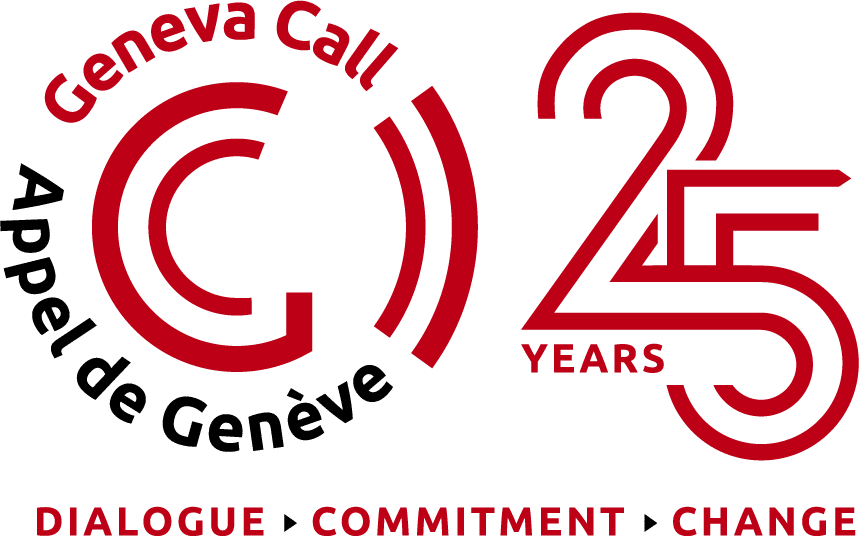Shia Religious Leaders set precedents and agree on IDP Protection in Najaf/Iraq
13 mai 2019
On 30 April, Shia religious leaders, religious scholars and academics from Iraq, Lebanon, Iran, Yemen and Bahrain convened in Najaf/Iraq at the Islamic University under the auspices of Geneva Call. The purpose of this meeting was to discuss how religious leaders could include protection messages into their regular practice with the goal of advocating and fostering better protection for IDPs in the Middle East region.
This humanitarian brought together 20 high level religious leaders to emphasize the prohibition of forced displacement of civilians, to review the humanitarian standards related to the protection of displaced persons during armed conflicts and to find appropriate solutions to the main obstacles facing their application. They agreed to and signed a common declaration (below) focusing specifically on the prohibition of forced displacement of civilians and the protection of displaced persons during armed conflict.
Dr Sheik Mohammed Husain Mokhtari (Chancellor of the University of Islamic Denomination or Madhaheb University, Tehran Iran) said: “Religious leaders, not only Muslims, but Christian and Jews as well, should advocate for states to implement a plan to protect IDPs. All sects have the capacity to help each other to solve this crisis”.
Sheik Dr. Khaled al Tamimi representative of the Al Hawza seminary (where Shia Muslim clerics are educated) in Najaf added: “There is complementarity between IHL and Islamic Law. If we look at IHL and the protection it bestows on civilians, we clearly see that it is echoes in Islam. In fact, IHL and Islam have many similarities in term of protection. IHL sheds light and explains some rules and regulations that already exists in Islam and other religions”.
While this event marks a significant step forward in terms of Geneva Call’s engagement with religious leaders, a precedent was set early 2017 when religious leaders discussed the compatibility of Islamic law with IHL provisions on the protection of civilians together with Geneva Call at the University of Najaf. This event marked the beginning of the organisation’s collaboration with religious leaders and scholars from the NAME region. Geneva Call intends to pursue this collaboration and replicate similar advocacy events in the region.
Najaf Document on the prohibition of forced displacement of civilians and the protection of displaced persons during armed conflicts and beyond
We, the religious scholars and researchers gathered, on the occasion of our workshop held in Najaf on Tuesday, 30/4/2019, to affirm the prohibition of forced displacement of civilians, review the humanitarian and Islamic standards related to the protection of displaced persons during armed conflicts and to find the appropriate solutions to the most important obstacles to their implementation.
Bearing in mind that the principle of the prohibition of forced displacement and the protection of displaced persons during hostilities is a fundamental humanitarian and Islamic principle.
Believing that protecting the displaced and not being subjected to armed conflict is part of the teachings of the Islamic religion, it cannot be ignored. It is found in the Holy Quran, Sunnah, and the guidance of the infallible imams (peace be upon them).
As we derive our strength from the religious guidance of our authorities to provide due protection to the displaced, we also derive our determination from our commitment to these standards in our previous battles.
We express our deep concern over the suffering of civilians during internal displacement and other acts of violence and the continuing violations against them during armed conflicts.
We are determined to take all necessary measures and possible ways to prevent such violations in all its forms and to call for the punishment of the perpetrators after their occurrence.
Bearing in mind the need to protect civilians during displacement, by adopting a number of humanitarian and Islamic standards, and in cooperation with Geneva Call
We are determined to call for a commitment to the following:
I. Prohibition of forced displacement of civilians
Prohibiting any form of displacement and prohibiting orders that cause the displacement of the civilian population for reasons related to armed conflict.
II. It is specifically prohibited:
1. To distinguish between the displaced on the basis of race, sex, color, religion, wealth or other similar causes.
2. To launch indiscriminate attacks on displaced people or their camps.
3. The use of displaced people as human shields or as hostages.
4. The use of IDP camps or settlements for military purposes.
III. To force displaced persons to return to their areas of origin;
Third: Protection of displaced persons: The following must be done in order to provide the greatest protection to the displaced:
1- To provide the best possible conditions to IDPS in terms of health, hygiene and nutrition
2. To a better protection of displaced persons from vulnerable groups.
3. Provide and facilitate the delivery of humanitarian assistance to the displaced
4. Disclosing the fate and whereabouts of the missing IDPs.
5 – To take measures to preserve the unity of the family or return after separation.
6 – Provide educational opportunities for displaced people, especially children.
7. Work to recover displaced persons’ property.
8. Facilitate the voluntary return of IDPs as soon as possible to their areas of origin
Done in Najaf on Tuesday, 30/4/2019
